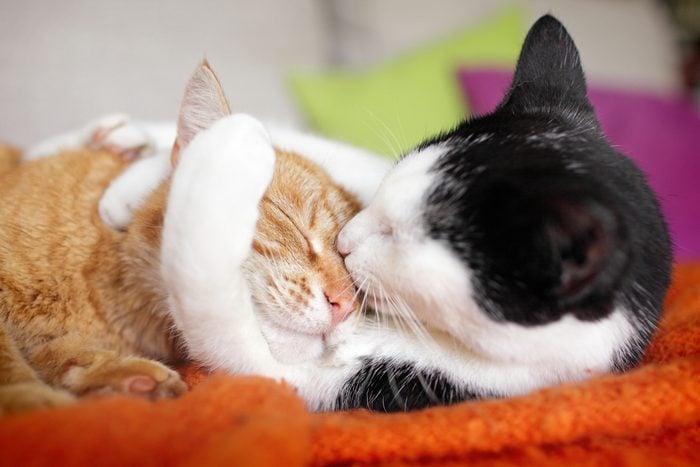
Extremely cute and fluffy cat breeds ahead!
Out of the more than 200 million cats padding around on our planet, a mere 45 breeds exist. Of those, only 11 are longhaired by definition (although another 12 can have long hair), according to the Cat Fanciers’ Association (CFA), the world’s largest registry of pedigreed cats. In other words, fluffy cat breeds are comparatively rare.
But what fluffy cats lack in ubiquity, they more than make up for in variety. Their impressive manes run the gamut from fine and flowing to full and frizzy. That said, there is one thing all these quirky creatures have in common: You can’t look away because they’re so gosh-darn adorable, whether they’re large, small or right smack in the middle. Learn more about these can’t-miss fluffy cat breeds—and bask in their furry fabulousness!
Get Reader’s Digest’s Read Up newsletter for more pets, humor, cleaning, travel, tech and fun facts all week long.
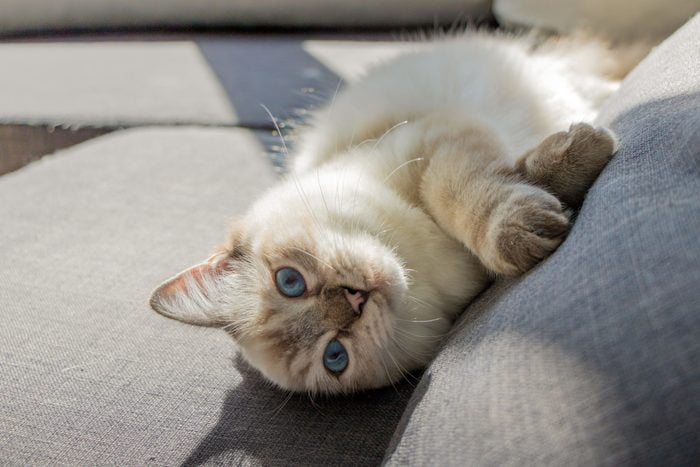
Ragdoll
Considering the Ragdoll’s enormous baby blues, soft silky coat and super affectionate nature, it shouldn’t come as a surprise that it’s the world’s most popular cat breed. Nor is it an accident. The Ragdoll was developed, starting in the 1960s, by a breeder of Persian cats through the careful selection of only the softest, most docile longhairs. Some say its ancestors are the Birman and/or the Angora, while others say it descends from a long line of good ol’ domestic longhairs (non-pedigree longhaired cats).
Whichever is true, the Ragdoll is a fairly petite fluffball feline with some very puppy-like qualities, such as a propensity to run to greet you at the door and follow you from room to room; it even has the ability to learn to play “fetch.” In case you were wondering, these are the telltale signs your cat is happy.
| Breed overview | |
| Ragdoll | |
| Height | 9–11 inches |
| Weight | 10–25 pounds |
| Life expectancy | 12–17 years |
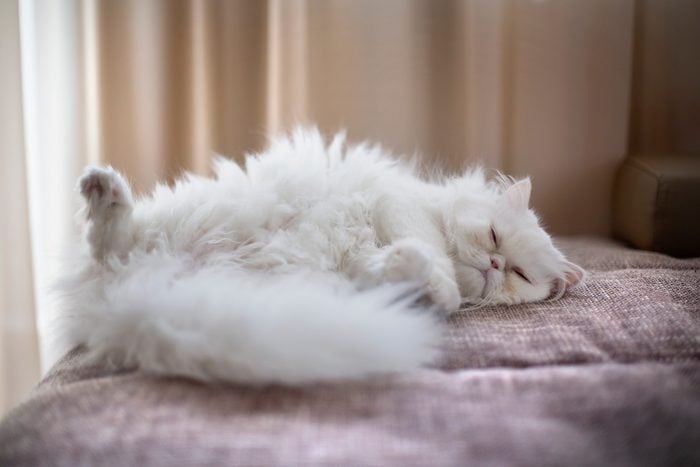
Persian
Persian cats come in the full spectrum of cat colors, but there’s no mistaking the relatively petite Persian for any other breed because of its long, flowing coat and distinctive face—with round, wide-set eyes, a sweet snub nose, chubby cheeks and itty-bitty rounded ears. Persian cats are popular for several reasons, including their sweet, gentle nature and their adaptability to even the most boisterous of households. In other words, if you have a house full of children, the Persian may be the purr-fect fluffy cat breed for your family.
But do bear in mind its coat requires daily brushing to keep it clean and mat-free. If your cat’s hair seems to be everywhere, try these pet-hair removers that really work.
| Breed overview | |
| Persian | |
| Height | 10–15 inches |
| Weight | 7–12 pounds |
| Life expectancy | 15–20 years |
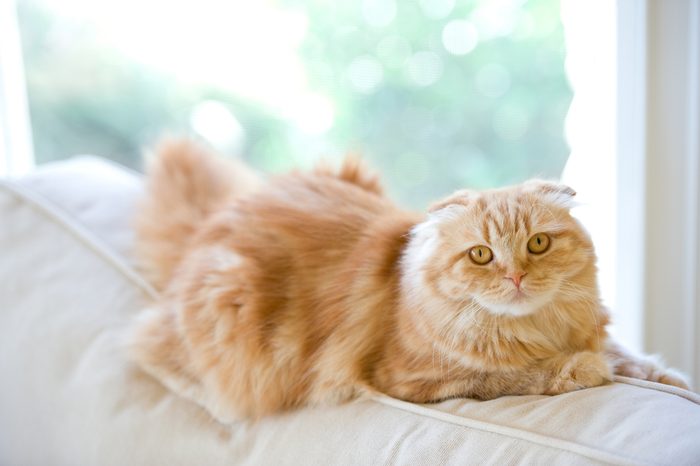
Scottish Fold
Scottish Folds are so named because their ears are folded forward and down, which, along with their round faces and intelligent eyes, lend them a sort of wise-old-owl look. Scottish Folds come in shorthaired and longhaired varieties, but all are soft and fluffy (with the longhaired version being more “puffy”), good-natured and highly adaptable—in fact, they’re “as comfortable in a room full of noisy children and dogs as they are in a single person’s dwelling,” according to the CFA.
Some Scottish Folds can be trained to walk on a leash and run agility courses. Unlike many other longhaired cats, Scottish Folds don’t necessarily require daily brushings; twice per week is usually enough. Fun fact: Scottish Folds’ fur can be several colors, including orange, black and white.
| Breed overview | |
| Scottish Fold | |
| Height | 8–10 inches |
| Weight | 6–13 pounds |
| Life expectancy | 12–16 years |
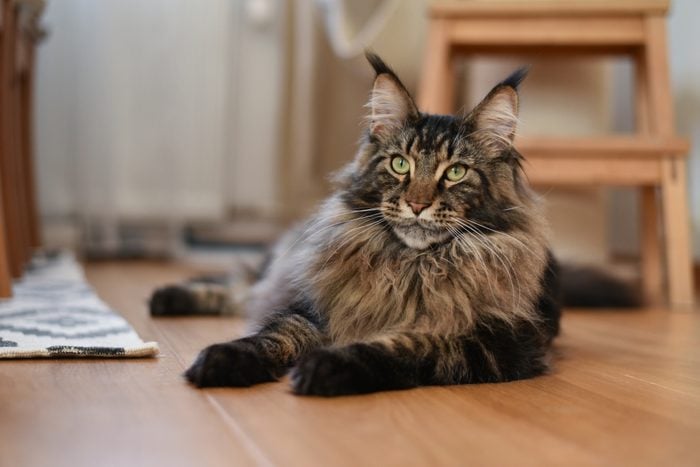
Maine Coon
Tipping the scales at an average weight of 20 to 25 pounds, the Maine Coon is one of the largest, if not the largest, American cat breed, according to MaineCoon.org. With its shaggy coat (it has three distinct lengths of hair, including a long, lion-like mane around its face), bushy raccoon-striped tail and tufted paws so big they act as snowshoes (keeping it from falling through the snow), the Maine Coon looks even bigger than it actually is.
But this gentle giant is so sweet and intelligent, it’s sought after not only as a pet but also as a therapy animal. Like the Scottish Fold, the Maine Coon can also be trained to walk on a leash.
| Breed overview | |
| Maine Coon | |
| Height | 8–16 inches |
| Weight | 10–25 pounds |
| Life expectancy | 10–13 years |
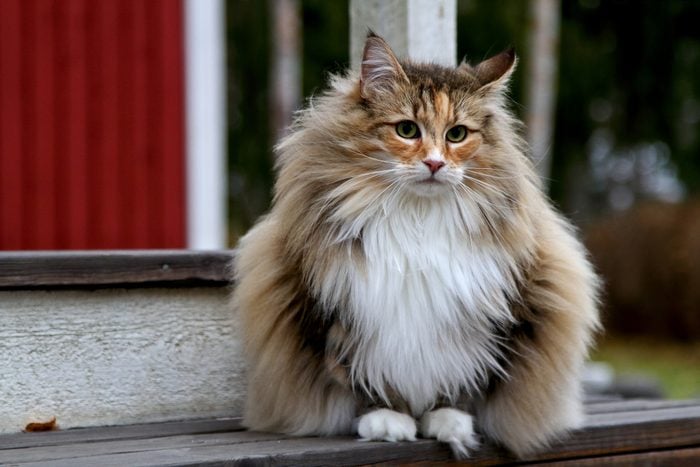
Norwegian Forest Cat
At first glance, you might mistake a Norwegian Forest Cat for a Maine Coon. Both are big, fluffy cat breeds that give off a more rugged than fussy impression. Both are also intelligent and outgoing. But look a bit closer, and you’ll see the Norwegian’s hair is fairly uniform in length (i.e., it has no mane around its head) and its nose isn’t “smooshed” but straight. Its ears are triangular, like the Maine Coon’s, but smaller and less furry.
Another big difference is their personality. While both are loyal to their humans, Norwegian Forest Cats also possess a strong independent streak. Or, as the CFA puts it, “THEY will decide when to get on or off that lap.” Speaking of personality—this is the cat breed most compatible with your zodiac sign. Take note!
| Breed overview | |
| Norwegian Forest Cat | |
| Height | 9–12 inches |
| Weight | 12–16 pounds |
| Life expectancy | 14–16 years |
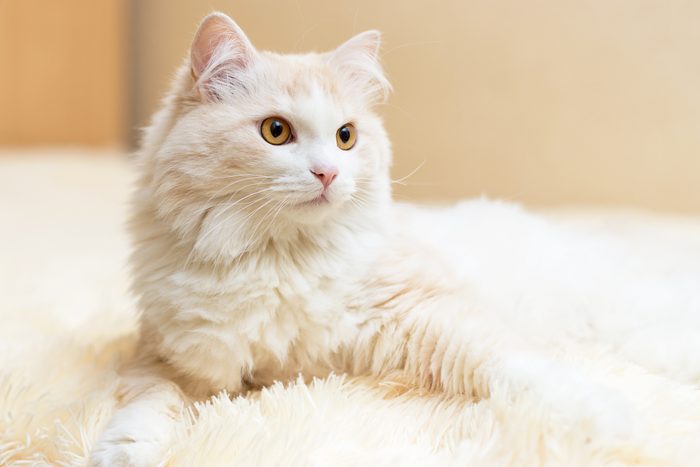
Turkish Angora
Lithe and elegant, the Turkish Angora is another of the older fluffy cat breeds. Although traditionally white, it’s been bred increasingly in a variety of colors in recent years. Known for its intelligence, playfulness and adaptability, the Angora is equally at home in a household with young children as it is in one with a senior adult.
Although they readily accept the companionship of other animals, these cats tend to assert themselves as the “alpha.” Unlike some of the longhaired breeds, Angoras require minimal grooming. “Most breeders recommend combing once or twice a week with a fine-toothed comb or slicker brush to remove excess hair and keep the coat looking and feeling its best,” notes the CFA.
| Breed overview | |
| Turkish Angora | |
| Height | 8–10 inches |
| Weight | 5–10 pounds |
| Life expectancy | 15–18 years |
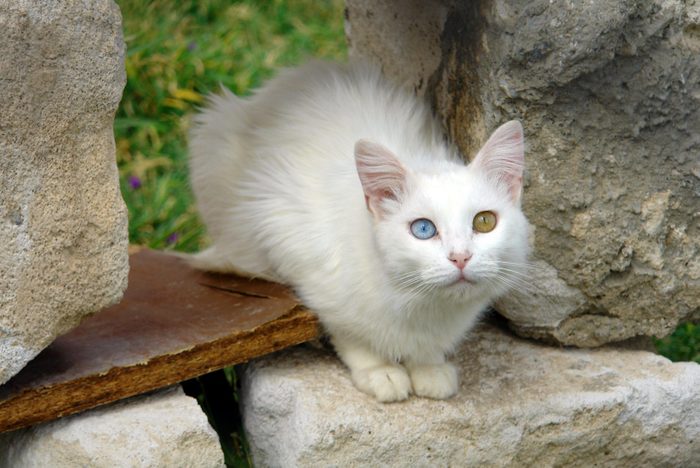
Turkish Van
The Turkish Van is nicknamed the “Swimming Cat.” This is the rare feline that doesn’t just tolerate water—it actually loves swimming. But that’s not all that makes this cat rare. An ancient breed developed in Southwest Asia, the Turkish Van has closely set almond eyes that are often two different colors (one blue and one yellow, for example). Its triangular face also features a straight profile, not unlike the Norwegian Forest Cat; incidentally, both breeds have a waterproof double coat that needs less grooming than that of many fluffy cat breeds. Energetic and playful, the Turkish Van is a fun companion, although not necessarily much of a lap cat.
| Breed overview | |
| Turkish Van | |
| Height | 10–14 inches |
| Weight | 10–20 pounds |
| Life expectancy | 7–12 years |
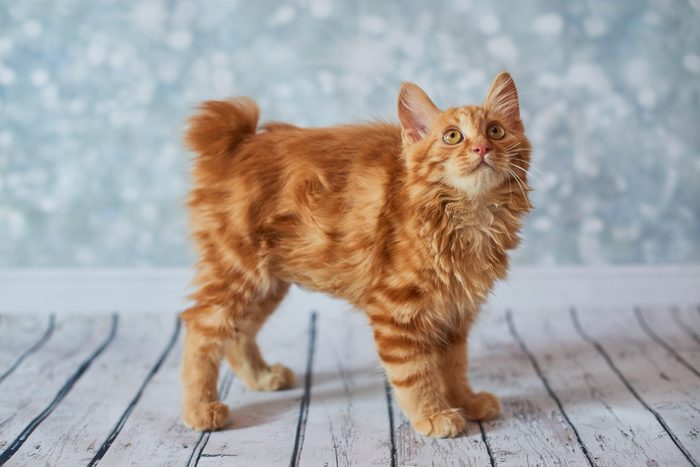
American Bobtail
If the American Bobtail has a bit of a wild look, it’s probably because this fluffy cat breed developed through natural selection to survive as ferals. Just watch the Bobtail stalk and hunt its toys and you’ll get the picture, although it’s all in good fun. Playful and interactive, the Bobtail—which comes in both shorthair and longhair varieties and is named for its short, fluffy tail that’s about half as long as your average cat’s—is known for initiating games with their people. It also has a secret talent for catching mosquitoes in midair. Interesting cat behavior, right?
| Breed overview | |
| American Bobtail | |
| Height | 9–10 inches |
| Weight | 7–16 pounds |
| Life expectancy | 13–15 years |
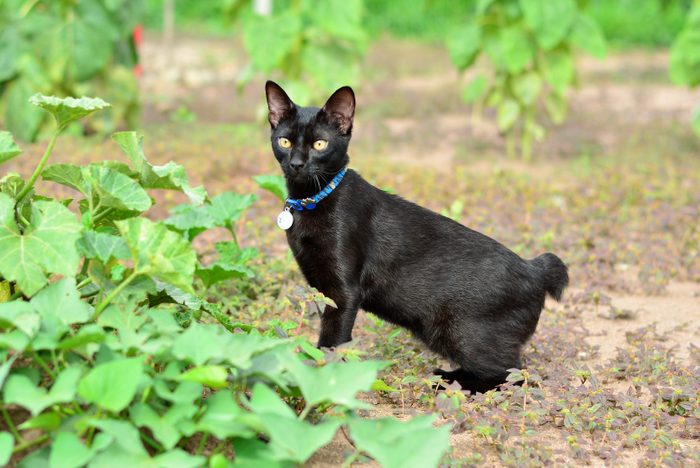
Japanese Bobtail
Another short-tailed fluffy cat breed, the Japanese Bobtail is easily distinguished from the American Bobtail by its rigid pom-pom-like tail. This people-oriented cat will follow you everywhere, joining you as you greet guests at the door and even sitting right on your laptop as you attempt to work.
Like the American Bobtail, the Japanese Bobtail has a tendency to play as if it were living out in the wild—pouncing on its toys and carrying them around in its mouth like prey. A Japanese Bobtail is a great choice if you’re looking for a cat you can train, especially in Feline Agility.
| Breed overview | |
| Japanese Bobtail | |
| Height | 8–9 inches |
| Weight | 6–10 pounds |
| Life expectancy | 15–18 years |
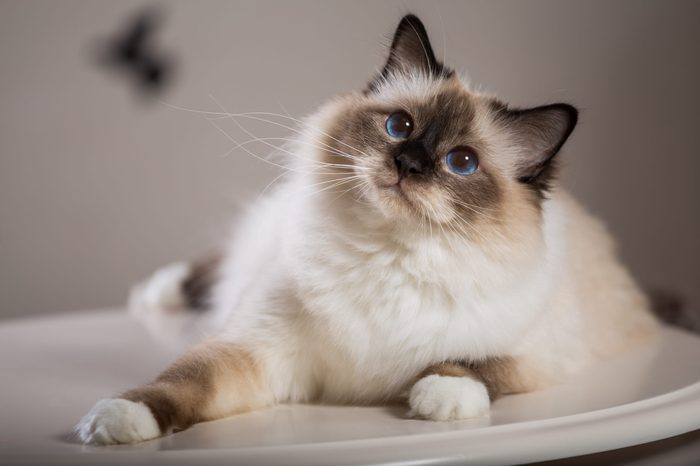
Birman
As mentioned above, if the Birman bears a resemblance to the Ragdoll, it might be because the Ragdoll may have Birman ancestry (along with Persian, Angora and possibly the domestic longhair). Like the Ragdoll, the Birman’s roots are a bit of a mystery, but what is known is that most in the United States came from Western Europe. Like the Persian, the Birman can be just about any color a cat can be, but what makes it distinctive is its white paws.
And like the Maine Coon, the Birman’s hair runs in different lengths on different parts of its body, with a bit of a mane around its face. Its coat is soft and silky and doesn’t have the tendency to mat. Even-tempered and quiet, the Birman is a polite but warm addition to any family. Make sure to check out the friendliest cat breeds.
| Breed overview | |
| Birman | |
| Height | 8–10 inches |
| Weight | 10–12 pounds |
| Life expectancy | 13–15 years |
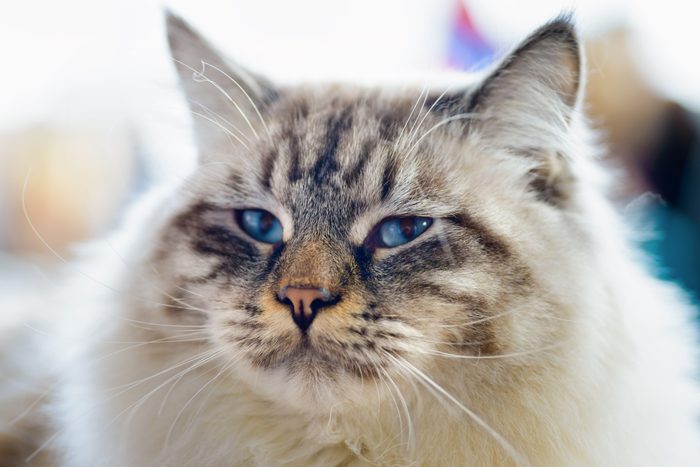
Ragamuffin
The Ragamuffin is surprisingly similar to its cousin the Ragdoll in many ways, even though it may not seem like it at first glance. Both descend from the same line, but breeders of the Ragamuffin allowed for more variation in eye and fur color, so Ragamuffins aren’t solely blue-eyed or solely white with points (color on the face, feet and tail). And while Ragdolls have a tendency to “go limp” (like a ragdoll) when picked up, Ragamuffins do not.
Otherwise, the Ragamuffin—which is around the same size as a Ragdoll and requires the same minimal grooming—possesses many of the characteristics valued by Ragdoll aficionados, including a super sweet and affectionate nature and a desire to bond with its family that can lead to “dog-like” comparisons. Here are more of the most affectionate cat breeds.
| Breed overview | |
| Ragamuffin | |
| Height | 10–15 inches |
| Weight | 10–20 pounds |
| Life expectancy | 12–18 years |
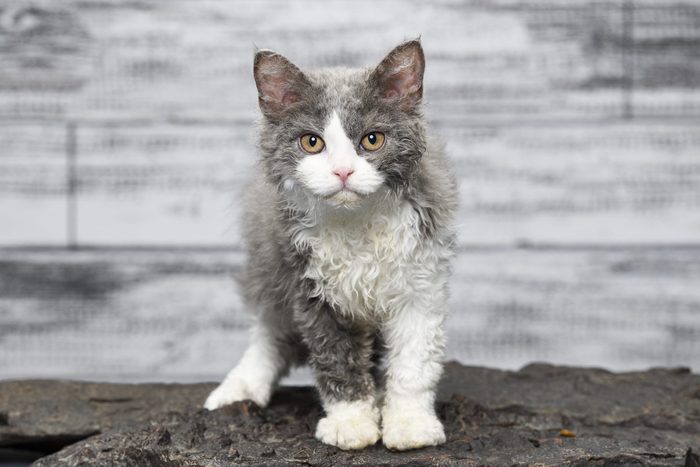
Selkirk Rex
The Selkirk Rex is the product of a pairing between a Persian and an ordinary house cat with extraordinarily curly hair that a breeder plucked from obscurity at a shelter in Montana. With a dominant curly-haired gene, a wildly curly Selkirk Rex can have littermates with fairly straight hair, but all Selkirk Rexes have curly whiskers prone to breakage.
Round-faced and heavy-boned, the Selkirk Rex is a stocky, sturdy breed with a patient and tolerant nature, which is what anyone who decides to live with a Selkirk Rex should be. (Because those “bad-hair day” and “get thee to a groomer” comments could never get tiresome, right?)
| Breed overview | |
| Selkirk Rex | |
| Height | 9–11 inches |
| Weight | 6–16 pounds |
| Life expectancy | 13–15 years |
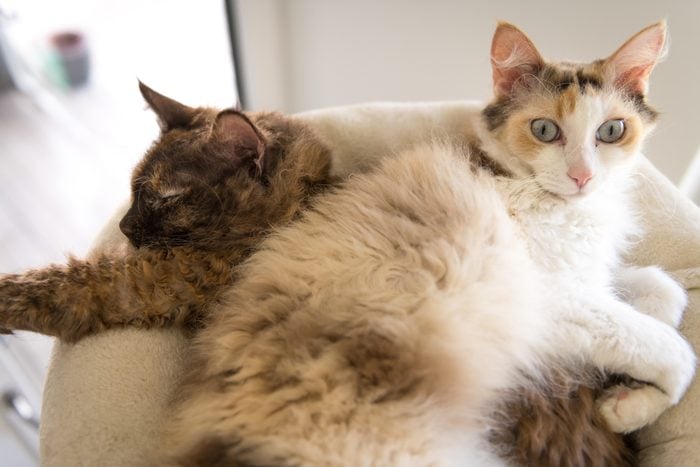
LaPerm
Another curly-haired cat breed, the aptly named LaPerm has an unusual origin story: It descended from a cat born with no hair at all that began sprouting a full coat of soft, springy ringlets eight weeks later. For the next decade after that first cat was born, the breeder made no attempt to cultivate it. Nevertheless, bald kittens that later sprouted curls increasingly turned up in the breeder’s litters until she decided to “just go with it.”
LaPerms now have waves that tend to part down the middle (like an Afghan Hound or a mature Yorkshire Terrier), as well as ringlets and corkscrews, the tightest occurring on this medium-size cat’s underside, tail and the base of the ears. The LaPerm’s coat is fairly low maintenance (you can often get away with simply wetting your fingers and running them through your kitty’s hair), and its personality is all about people-pleasing. Don’t be surprised if your LaPerm reaches out to touch your face with her paw just to say “hi.”
| Breed overview | |
| LaPerm | |
| Height | 6–10 inches |
| Weight | 8–10 pounds |
| Life expectancy | 10–15 years |
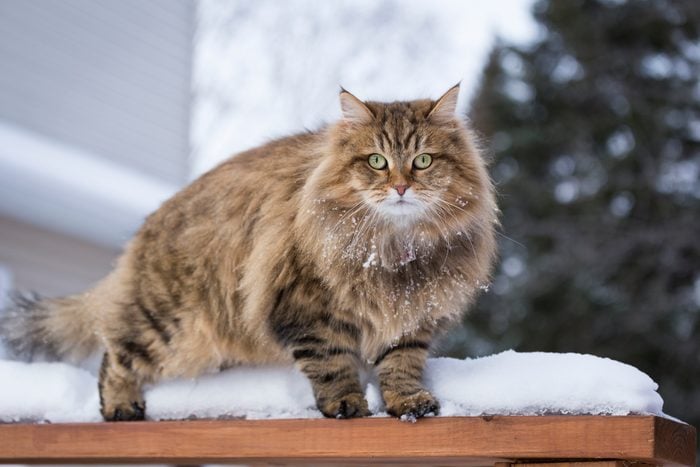
Siberian
Russia’s native forest cat, the Siberian, predates even the Persian, making its first appearance in recorded history in Siberia around the year 1000. Medium to large in size and naturally selected for its ability to survive extreme cold, the Siberian not only brings to mind the Siberian Tiger but also the Maine Coon and the Norwegian Forest Cat, both of which have super thick waterproof coats. Like the Norwegian, the Siberian has a straight nose, but the Siberian is “rounder” overall, with a fluffier quality to its soft, dark-rimmed eyes and its curved-edge ears. Unlike the Maine Coon or Norwegian, the Siberian’s body is barrel-like and has surprising heft for its size.
Despite being a fluffy cat breed, the Siberian takes responsibility for its own grooming; it’s rare you’d have to brush yours. But you will want to give your Siberian plenty of mental stimulation because this breed is highly intelligent and likes to occupy itself with learning—both through observation and engagement.
| Breed overview | |
| Siberian | |
| Height | 10–12 inches |
| Weight | 5–12 pounds |
| Life expectancy | 8–10 years |
Next, check out these pictures of cats making themselves comfortable just about anywhere. And if you can’t get enough cat pictures in your life, check out these ugly cats that are actually still super cute.
Sources:
- Cat Fanciers’ Association
- The Ragdoll Cat Lifestyle + Natural Cat Care Site: “The Bizarre and Weird History of the Ragdoll Cat!”
- Maincoon.org: “Does size matter? What is the average weight of a Maine Coon?”
